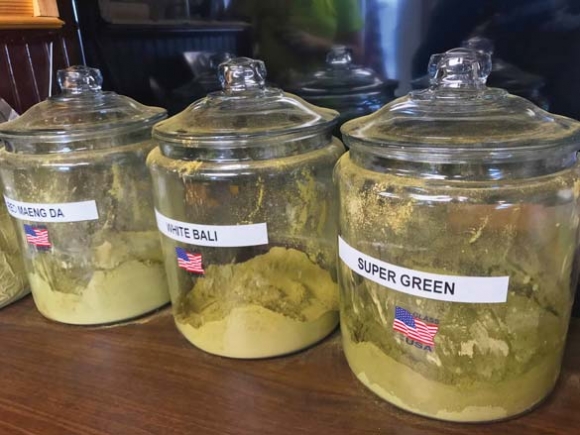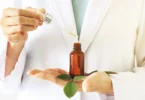 Written by Cory Vaillancourt
Written by Cory Vaillancourt
Brendan Bishop is more than just the manager of Haywood Vapor, located at the corner of Dellwood City Road and Russ Avenue in Waynesville.
He’s also a satisfied customer who can testify to the advantages of ditching prescription pharmaceuticals in favor of lesser-known treatments for common ailments and addictions.
“The main reason people vape is to quit smoking cigarettes,” Bishop said. “It has been, in my personal experience.”
Fresh out of the military, Bishop said he didn’t want to quit smoking but did it anyway.
“I tried all the different pharmaceuticals available, from Chantix to Zyban, the patches, the gum, the lozenges, hypnosis — everything. No luck,” he said, until his doctor encouraged him to look into vaping back in 2012.
“That pretty much saved my life. The doctor said that if I didn’t quit smoking at 22 years old, I would have died,” he said. “Five years later I’m doing great, my lungs are clear, and a lot of our customers share that same experience.”
Prescription medications can sometimes end up being worse than the conditions they’re intended to treat; the mind-bending side effects of Chantix are well known, as are the dangers of tranquilizers and sedatives.
“Me personally, and a lot of my veteran friends have anxiety and post-traumatic stress disorder problems,” Bishop said. “Typically we were all prescribed benzodiazepines when we got out of the military, and I was on Klonopin for about a year and a half when I got to the point where I didn’t like the way it made me feel when I stopped taking it.”
Bishop said he’d experienced withdrawal symptoms, which in some cases can include everything from nausea to tremors to hallucinations to seizures and thoughts of suicide.
“The doctors told me you can die from stopping taking Klonopin, which I did not know. So I was searching for alternatives and found CBD and it worked great.”
CBD is short for cannabidiol, a compound derived from hemp, but don’t confuse it with its more psychoactive hippie cousin, marijuana.
“It’s derived from hemp, so it’s all natural, but there’s no THC in it or if there is, it’s less than .3 percent by volume, which is the legal limit,” Bishop said. “You experience zero high whatsoever off of the CBD oil. All it’s going to do for you is, it’s good for relaxing, but you might not experience any effects at all if you don’t have any problems. So it’s definitely a medicine, and that’s all it is.”
It’s also good for seizures, joint pain, arthritis, swelling or chronic nerve pain, Bishop said, adding that CBD has no use recreationally.
But that doesn’t stop some misinformed customers from stopping into Bishop’s shop hoping to cop a quick, cheap high.
“They come in wondering what CBD is. ‘Will it get me high?’” Bishop laughed. “It has the stigma because it’s related to the cannabis plant, and some people think it’s going to get them high. It will not. Whatsoever.”
Local police, on the other hand, all seem to be very well informed, according to Bishop — both on the CBD and on something called kratom, also sold at Bishop’s shop.
“It’s a plant that grows in Southeast Asia. It is akin to the coffee tree, very similar, same family. But the difference here is that kratom isn’t caffeine-based, it’s alkaloid based,” said Bishop.
Haywood Vapor sells several varieties, all of which have different effects: Red Maeng Da is for relaxation, pain relief and insomnia, whereas the White Bali is an energy booster and “a good Red Bull alternative” according to Bishop.
Bishop also said that although kratom can be used recreationally — with benefits and addictive risks similar to that of coffee — most people who come in looking for it aren’t interested in recreation.
“It is excellent for helping to ease [opiate] withdrawal symptoms,” Bishop said. “It doesn’t make the symptoms go away completely, because it’s not an opioid, but it does act on the opioid receptors in your brain. It does fill up those opioid receptors, but it fills up the delta and the mu receptors. Take Suboxone, for example — that affects more of the delta opioid receptors, so even though those ones are full, you still have other receptors there, but it’s not going to create another dependency, and that’s the goal.”
Dr. Matt Holmes, associate medical director for Meridian Behavioral Health Services concurs with Bishop, saying that kratom hits the same receptors in the brain that opioids do, and that while it can be used as a safer alternative to heroin or painkillers, even natural substances can have risks, just as naturally occurring cannabis can have certain benefits and risks.
“People can use plenty of it and have a similar effect as opioids do, and they also experience withdrawal from it,” Holmes said.
There have been a few overdose deaths associated with kratom across the country, but data are still inconclusive on its true dangers because those deaths have always occurred in conjunction with other drugs.
Waynesville Police Chief Bill Hollingsed said he’d received no complaints about the sale or use of either CBD or kratom that he could recall.
A 2016 effort in the North Carolina General Assembly could have banned kratom in the state — as have Alabama, Arkansas, Indiana, Tennessee and Wisconsin — but instead restricted its sale to those over the age of 18, partly in response to the pleas of recovering addicts who seek solace in the substance.
“We have lots of success stories of people coming in every day, people who are functional and living their lives again and being contributing members of society again, just because of kratom,” Bishop said. “Unfortunately it’s often their last resort because very few people know about it.”
Dr. Holmes, however, cautions addicts who rely on it.
“I wouldn’t recommend using it on their own to get off opioids — the best thing to do is get professional medical treatment,” he said. Meridian’s opioid medical treatment includes Suboxone or Methadone along with professional counseling and monitoring.
“There are tons and tons of people who use kratom daily,” Bishop said, “and you would never know, you would never guess. More people die from sex, that’s how we like to put it.”







